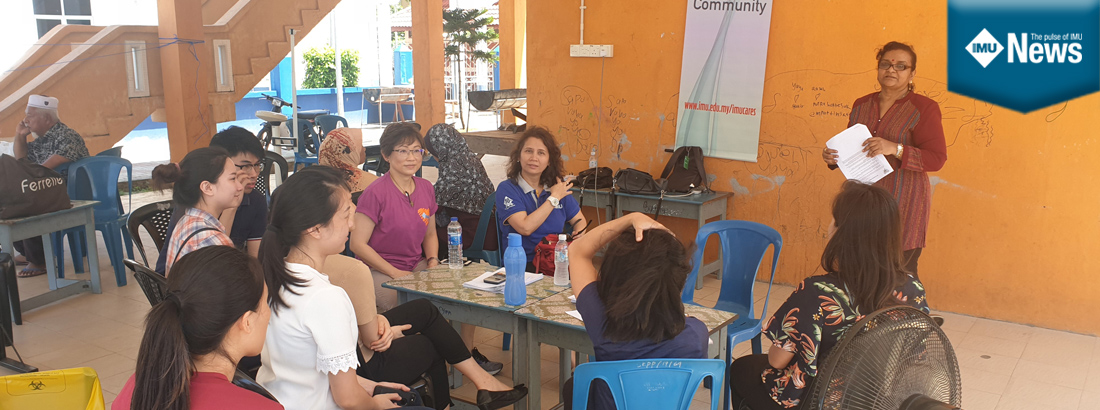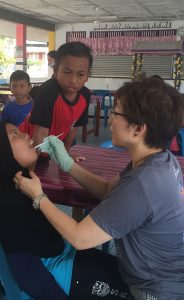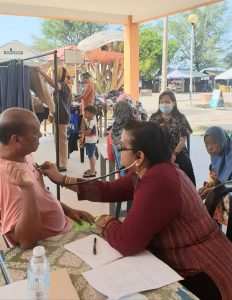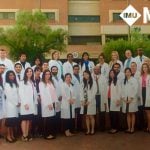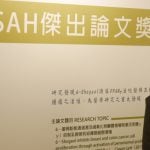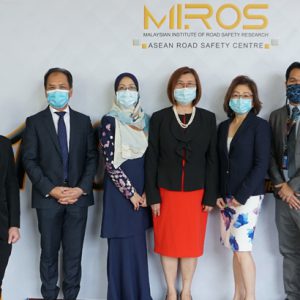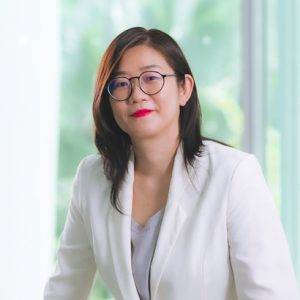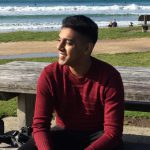13 – 15 June 2019 – It was a beautiful sunny day when the IMU Cares Project Team descended on the small, idyllic island of Pulau Perhentian Kecil, off the coast from Terengganu. The team comprised of medical specialists, dental specialists, nutritionists who are staff, students and alumni of IMU. The nutritional team was led by Jowynna Teo from “Junior Nutri Chef”. We were then joined by volunteers from our community partner, “Ecoteer”, a NGO group who were already stationed at the island for eco-conservation activities. 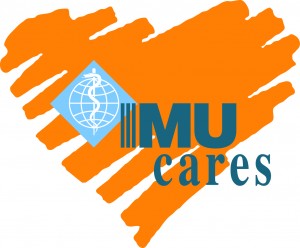 The island has a population of 3000 people with 60% of them being females. The main economic activity is small scale commerce and tourism. Facilities included a Health Clinic, a primary school and a police post. It needed an approximately 30-minute journey to reach the mainland by speedboat. Schools of fishes swimming under the wooden jetty could be seen as the tranquil waters surrounding the island were breathtakingly crystal clear. The project was a result of a request from a nutritionist who had conducted a preliminary survey on the island where it was found that the oral hygiene of the children was bad and a number of the islanders are obese and has symptoms of gout. A snapshot of the existing morbidity mix within the population, provided by the Assistant Medical officer (AMO) from the Ministry of Health (MOH) Health Clinic, specifically for non-communicable diseases included 1.0% of the population diagnosed with Diabetes Mellitus, 4.3% with Hypertension and 0.2% with Cardiovascular disease.
The island has a population of 3000 people with 60% of them being females. The main economic activity is small scale commerce and tourism. Facilities included a Health Clinic, a primary school and a police post. It needed an approximately 30-minute journey to reach the mainland by speedboat. Schools of fishes swimming under the wooden jetty could be seen as the tranquil waters surrounding the island were breathtakingly crystal clear. The project was a result of a request from a nutritionist who had conducted a preliminary survey on the island where it was found that the oral hygiene of the children was bad and a number of the islanders are obese and has symptoms of gout. A snapshot of the existing morbidity mix within the population, provided by the Assistant Medical officer (AMO) from the Ministry of Health (MOH) Health Clinic, specifically for non-communicable diseases included 1.0% of the population diagnosed with Diabetes Mellitus, 4.3% with Hypertension and 0.2% with Cardiovascular disease.
| Hence, the 2-day visit to Pulau Perhentian Kecil had three objectives: |
|---|
| Adult medical health screening with NCD knowledge survey and a health promotion talk; |
| Pediatric oral health screening with survey and dental health promotion; |
| Nutrition survey and promotional talk. |
Prior to the visit to the island, permission was obtained from the Terengganu State Health Authorities to execute this project. Preparation activities were conducted on the evening upon our arrival, which included briefings to both the IMU team and the Ecoteer volunteers. The AMO from the Health Clinic also pitched in to help set up the activity site.
For two days, the medical team was stationed at an open air building facing the sea, whilst the dental team was within a school compound as advised by the village head (ketua kampong) where access to a washing area in the school canteen was available for the tooth-brushing drill.
The health activities were conducted in a laidback and amiable atmosphere where the school children were able to be vibrant, high-spirited and curious. The adults were contiously trickling in. However, on the second day, which was a Saturday, the turn-out was smaller as the island residents were engaged by the surge of weekend tourists.
The adult villagers were screened and a portion of them had medical consultations. All the adults consulted were given nutritional guidance, counselling and referrals to the MOH facilities when required. The school children were screened and given appropriate health education talks and demonstrations on proper tooth brushing. The health promotion / education activity on the second day saw a bigger turn-out among the school children as compared to the adult group. The teams will be analysing the data collected and a subsequent report will be prepared. The team were also fortunate to have the helpful on-call staff at the MOH Health Clinic honoring our prescriptions with medications for common ailments such as cough, colds, fever and body aches. 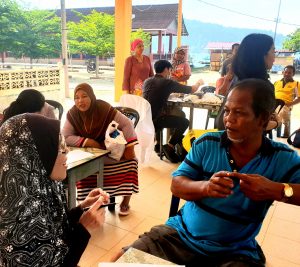 Apart from the intended activities, the group was also greeted with the generosity of the island residents. The residents had a ritual cook-out every Friday due to the Muslim congregation for prayer, and they invited the whole team to join in tasting the delicious fish-based bubur lambuk, cooked in a Pulau Perhentian Kecil fashion. All in all, the two days were tiring but immensely fulfilling for the team as we learned a lot about rural folks and their culture, as well as our strengths and weaknesses, while assimilating our time and effort into the community. Hopefully, through this, similar projects can be emulated in other far-reach areas of the country, with the feasibility impact factor incorporated to assess the sustainability of the activities.
Apart from the intended activities, the group was also greeted with the generosity of the island residents. The residents had a ritual cook-out every Friday due to the Muslim congregation for prayer, and they invited the whole team to join in tasting the delicious fish-based bubur lambuk, cooked in a Pulau Perhentian Kecil fashion. All in all, the two days were tiring but immensely fulfilling for the team as we learned a lot about rural folks and their culture, as well as our strengths and weaknesses, while assimilating our time and effort into the community. Hopefully, through this, similar projects can be emulated in other far-reach areas of the country, with the feasibility impact factor incorporated to assess the sustainability of the activities.
Written by Dr Leela V Sabapathy, Senior Lecturer, School of Medicine, IMU




